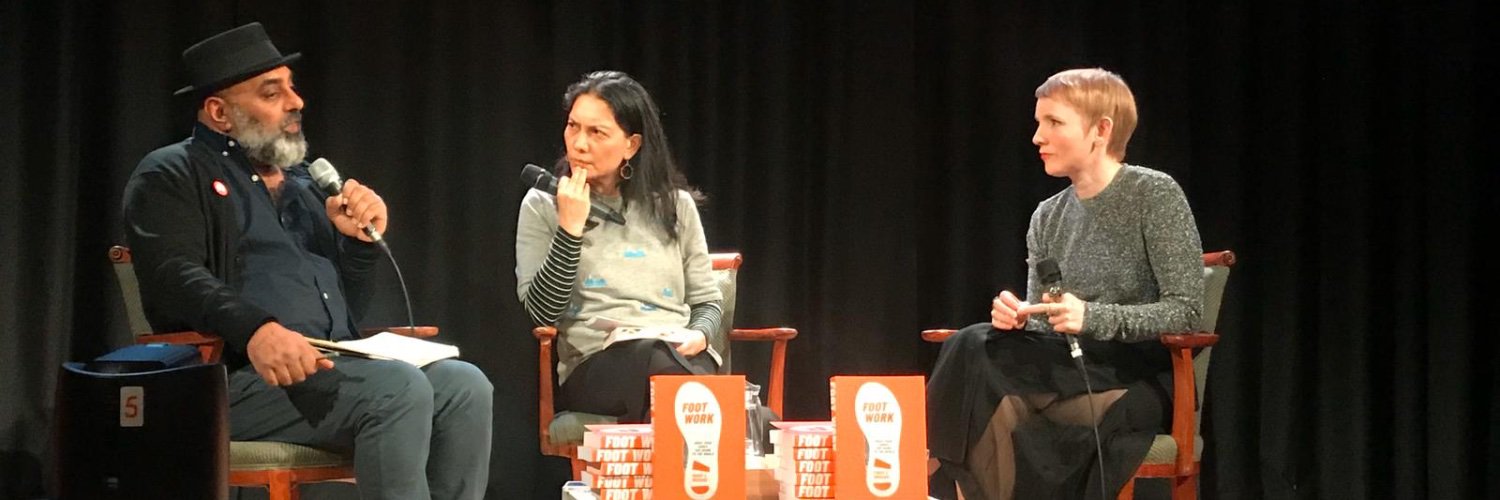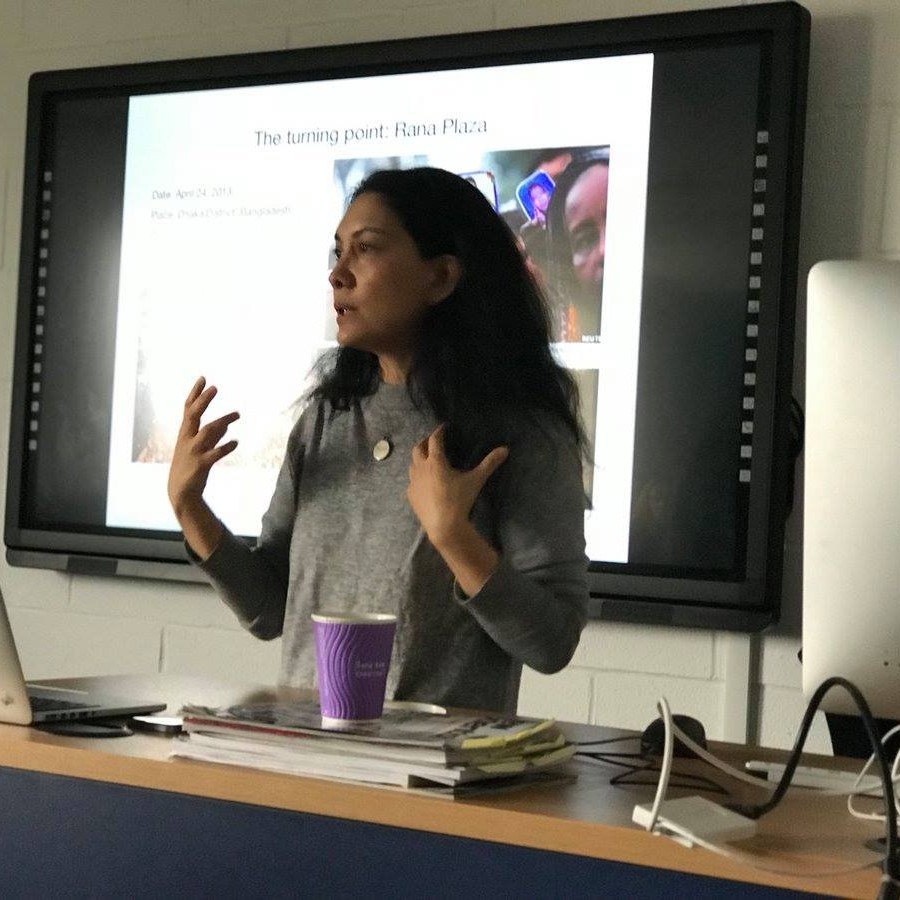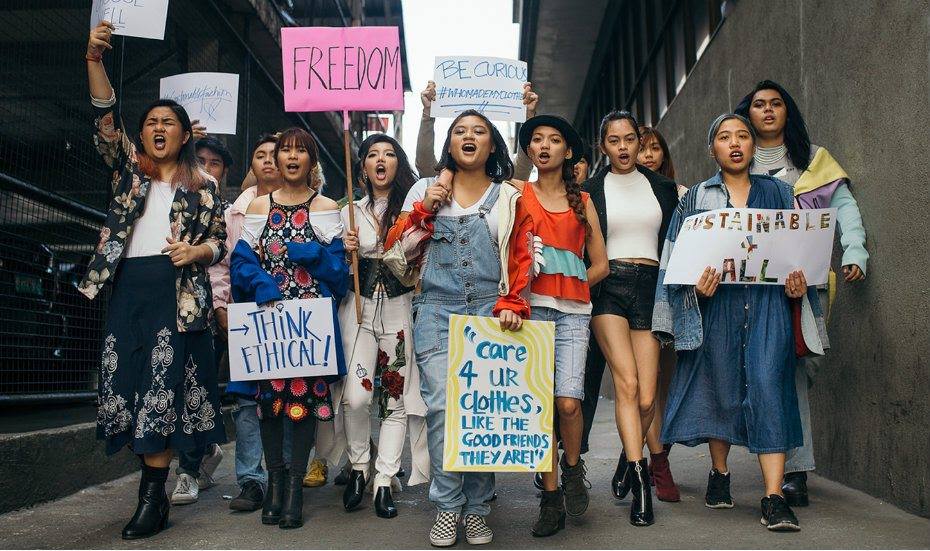
Part 2 MARK STATMAN: MEXICO AND THE POETRY OF GRIEF AND CELEBRATION
Part 2 of my interview with Mark Statman looks closely at Mark’s Latin American poetic influences, his life in Mexico and ends with an extract


I interviewed Bel Jacobs FRSA, writer and speaker on climate justice, animal rights and alternative systems in fashion. Bel‘s interview is an urgent message about the role of the fashion industry in climate/eco breakdown and the need to develop empathy for animals.
Leslie: What is Fashion Act Now and what was the tipping point that led you to co-found it, please?
Bel: Fashion Act Now emerged out of our activism on the street as XR Fashion Action. We’d run a series of successful actions including the 2019 Funeral for Fashion in front of the British Fashion Council in 2019 but there was a growing understanding that there was only so much we could do on the streets and that we might need to communicate with the fashion industry in a more formal way. We all came from fashion ourselves and we wanted to use our contacts and influence with brands, working from an emergency mindset. It didn’t really pan out like that and now exists as a very beautiful and largely academic project. I have since stepped back from it.
Leslie: What’s the story of your own interest in fashion? When and how did it begin, grow and develop?
Bel: It was a serendipitous encounter. I started off as shopping editor for Metro but it soon became clear that what I was really interested was not interiors and homeware but fashion! From that point, the industry just drew me in – with its fizz and beauty and some of the most creative people in the world. However, as you can probably tell from my current projects, when disillusion hit, it hit hard. The mainstream industry, which I had to cover on Metro, was really far less focused on people, creativity and culture than on profit, status and hierarchy. Remember, I edited the fashion page between 1999 and 2014 so I was there during as fast fashion really started gaining traction. By the time I left, the excess and appetite were really grotesque.
Leslie: How has fashion journalism and fashion itself changed since you worked for The Metro? How do you see it changing in the future?
Bel: Some of it hasn’t changed at all. Look at some of the most popular magazines and they’re still using the same old formats to drive consumption as if there’s nothing wrong with climate, ecology, social justice etc etc. Others make an attempt and run great features on sustainable fashion – but are stymied by a system that requires them, for example, include the products of advertisers who have not been vetted to any particular sustainable standard. The industry is made up of individuals who care deeply but have their hands tied. And then there are others – I cite some of the journalists in Vogue Business – who are really trying to drive progress with hard hitting articles around difficult issues such as vegan fibres and degrowth. This is progress, in an industry that fundamentally can’t – and in some parts, doesn’t want to – change.

Leslie: Why do we like to dress up? How can the drive expand our nature and bring us together as a community?
Bel: Dressing up, decorating ourselves, is as old as human culture. Where it will start to work better than it does now (I’m talking from a Western perspective) is when it frees itself again from ideas of status and exploitation to express instead solidarity with our place, our nature, our more-than-human kin, our community – and not simply via aesthetics but through how and by whom it’s made. There are clothing systems around the world in which cloth is carefully woven by loved ones, gifted, mended and worn again, and then passed down through to the next generation. The current industry has had a huge role in destroying these cultures, taking their practitioners and corralling them into factories, growing crops for fibres on their lands. We must consciously, and with humility, recreate our own indigenous clothing systems whilst making reparation for the damage wrought on other cultures. This is why fashion is so interesting: its impact lies across social, environmental and animal justice.
Leslie: What is the Empathy Project and what led you to found it, please?
Bel: In 2016, I came across the Yulin dog meat festival, which still takes place once a year but is the tip of the iceberg when it comes to the dog meat trade as a whole. The practices there are abhorrent. There is no excuse and there never can be. I campaigned to stop it but started to come across all sorts of animal abuse in the name of industry and entertainment – and fashion. And not just in China, here in the West.
That made me realise that, while I might be able to address one practice, all the others would continue and what we actually need to do is to ask ourselves some very hard questions about how we actually regard animals – and vulnerable beings, including humans, in general. We claim to be animal lovers, for example, but we are horrifically profligate with their lives and deaths. And we enable this by turning away from all the evidence that should be raising red flags for us. My social media feed is full, on the one hand, of beautiful animals being adored – and, on the other, of beautiful animals fighting for their lives.
How have we allowed ourselves a culture in which someone buys a puppy to beat him to death in three days? Or in which a bunch of agricultural students think it’s funny to put a firework in a living sheep and blow her up? This speaks to a broken society, traumatised to its core, where compassion is mocked and ignored.

The Empathy Project seeks to reframe human relationship to animals, by telling some of the animals’ stories but also by highlighting areas where our deep love of animals is starting to win through. Veganism is political; it’s a belief rooted in justice, in kindness, fuelled by outrage and deep love. And to the person who once said to me, ‘what about the children in Gaza?’ (Let’s pause a moment here to remember them, all 17,000 killed – a genocide), it’s worth understanding that all violence is connected and when you enable one, you create a culture where all the others become a little more acceptable.
And you create a world in which the climate is rapidly heating up, ecology is dying and our appetite for animal bodies is one of the leading causes; where only four percent of mammals alive today are wild while 60 percent are farmed for meat. Where we are losing our world, our place in the universe, the one green planet for hamburgers. The answer to all this is care for all beings – and we refuse to accept it. Even last night, I ran a workshop saying these things and people murmured something about reducing beef. It bewilders me.
Leslie: What have been the most inspiring stories of communities coming together that you’ve experienced?
Bel: There are many – and more arising, from the national web of climate centres, of which I run one, to movement such as the Transition Town Network; to the Doughnut Economics Action Labs and Doughnut cities, and more. The growth of this movement comes in recognition that, really, governments and businesses are not coming to save us; it’s up to people, in community, to save ourselves. That can be hard work; its translation on the ground can feel like relentless attempts at outreach to try to bring people’s scattered attentions to the offerings at hand. But when it works, it can be very fulfilling. And yet, when you use the word community, I think of a short clip I once saw, of indigenous people in the Amazon (currently being destroyed by the meat industry), trying to put out a forest fire with dried palm leaves. As I said before, all evidence exists for us to make change possible. We just need to stop ignoring it.
“I believe that whenever we destroy beauty, or whenever we substitute something man-made and artificial for a natural feature of the earth, we have retarded some part of man’s spiritual growth.” Lost Woods: The Discovered Writing of Rachel Carson.
Next week, poet Tracey Rhys, writer of Teaching a Bird to Sing and winner of the Poetry Archive’s video competition reviews Ways To Be Equally Human.
ABOUT LESLIE TATE’S BOOKS

Part 2 of my interview with Mark Statman looks closely at Mark’s Latin American poetic influences, his life in Mexico and ends with an extract

I interviewed international poet and translator Mark Statman about Volverse/Volver, his 14th published collection. Mark, who has won national arts awards, is Emeritus Professor of Literary

I interviewed Lisa Dart, finalist in the Grolier, Aesthetica and Troubadour Poetry Prizes and author of The Linguistics of Light (poems, Salt, 2008), Fathom (prose

I interviewed writer Julia Lee Barclay-Morton about her experience of autism. Julia began as an experimental dramatist in New York, moving to the UK to

I interviewed Gillean McDougall from Glasgow, who edited the collaborative projects Honest Error (on Charles Rennie Mackintosh and his wife Margaret Macdonald) and Writing the
| Cookie | Duration | Description |
|---|---|---|
| cookielawinfo-checkbox-analytics | 11 months | This cookie is set by GDPR Cookie Consent plugin. The cookie is used to store the user consent for the cookies in the category "Analytics". |
| cookielawinfo-checkbox-functional | 11 months | The cookie is set by GDPR cookie consent to record the user consent for the cookies in the category "Functional". |
| cookielawinfo-checkbox-necessary | 11 months | This cookie is set by GDPR Cookie Consent plugin. The cookies is used to store the user consent for the cookies in the category "Necessary". |
| cookielawinfo-checkbox-others | 11 months | This cookie is set by GDPR Cookie Consent plugin. The cookie is used to store the user consent for the cookies in the category "Other. |
| cookielawinfo-checkbox-performance | 11 months | This cookie is set by GDPR Cookie Consent plugin. The cookie is used to store the user consent for the cookies in the category "Performance". |
| viewed_cookie_policy | 11 months | The cookie is set by the GDPR Cookie Consent plugin and is used to store whether or not user has consented to the use of cookies. It does not store any personal data. |